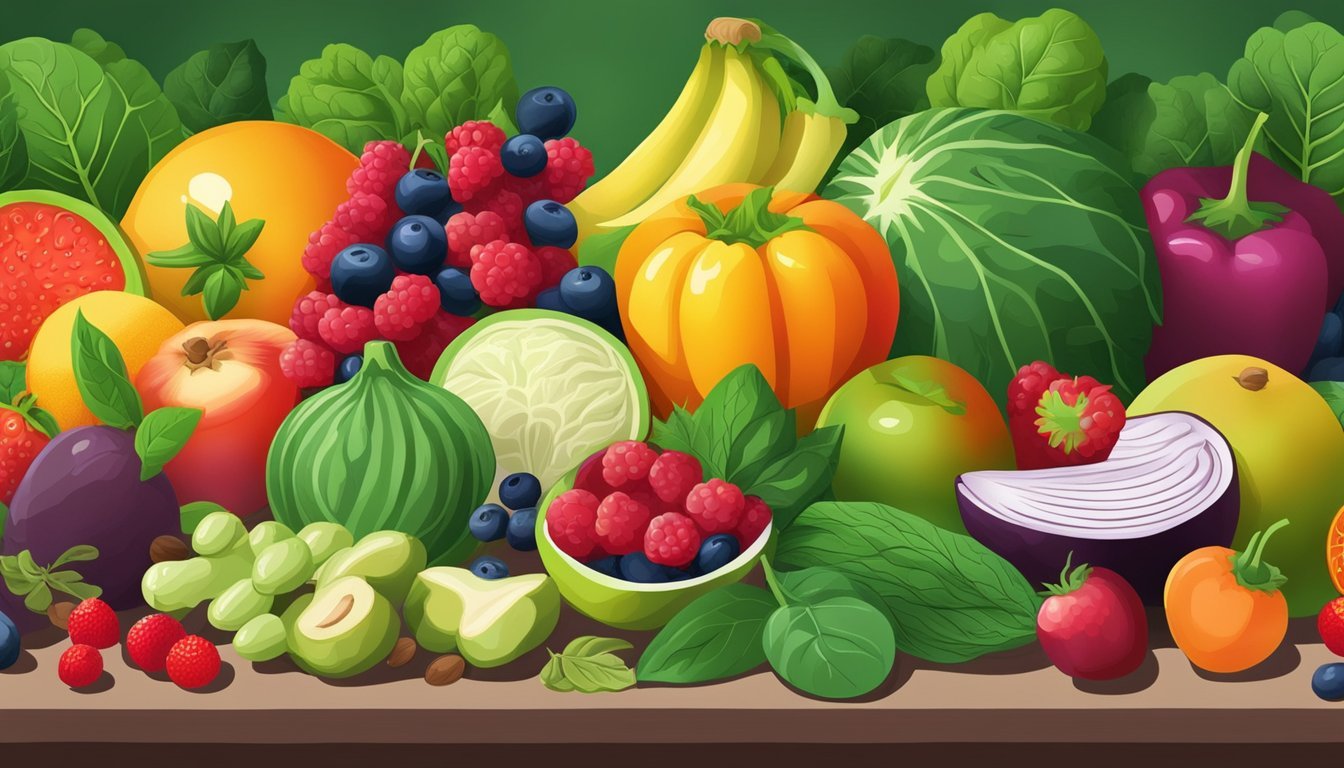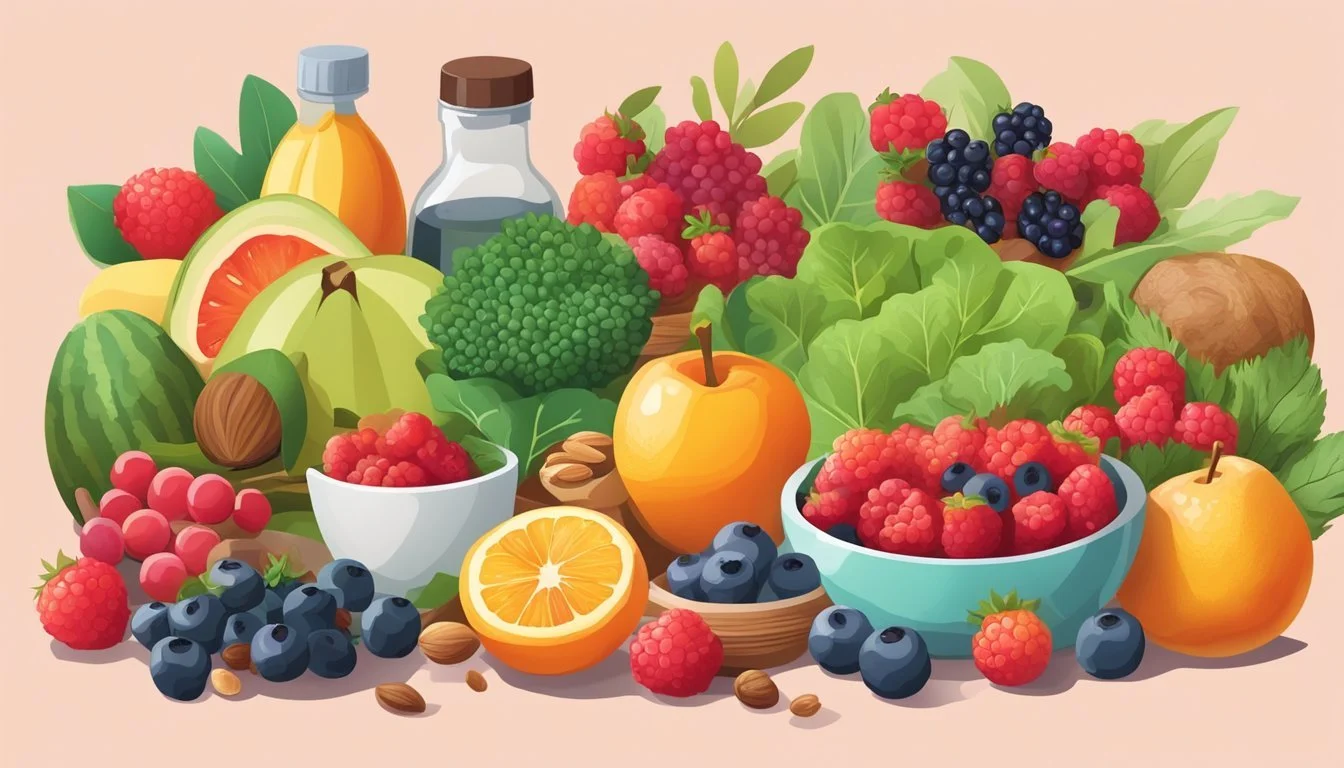Top Foods High in Antioxidants
Boost Your Health Naturally
Antioxidants are compounds that the body utilizes to defend cells against the damaging effects of free radicals—unstable molecules produced during normal cellular metabolism and in response to environmental stresses. The imbalance between free radicals and antioxidants can lead to oxidative stress, which is associated with a variety of chronic diseases, including cancer, heart disease, and neurodegenerative disorders. A diet rich in antioxidants is therefore recommended as a strategy to maintain health and protect the body from these diseases.
Foods high in antioxidants offer a natural arsenal against oxidative stress. Berries, such as blueberries and blackberries (how long do blackberries last?), are noted for their high antioxidant content, alongside other fruits like strawberries and goji berries. Vegetables including spinach, broccoli (how long does broccoli last?), and potatoes are also significant sources of various antioxidants. Nuts, spices, and even certain grains contribute to this protective dietary component.
Not all antioxidants are the same, and they act in different ways to protect the body's cells. Vitamin C, for example, is a water-soluble vitamin and a well-known antioxidant found in citrus fruits and vegetables like bell peppers and tomatoes. Vitamin E, which comprises multiple forms but has α-tocopherol as the most active, is present in leafy greens and nuts. Incorporating a diverse range of these antioxidant-rich foods into one’s diet can help combat oxidative stress and support overall health.
Understanding Antioxidants
Antioxidants are vital in protecting cells from the damaging effects of oxidative stress caused by free radicals. They include a range of vitamins, minerals, and compounds crucial for maintaining health.
Role in Fighting Free Radicals
Free radicals are unstable molecules that can damage cells, leading to oxidative stress, which is associated with various diseases. Antioxidants mitigate this threat by neutralizing free radicals, thus preventing cell damage. They achieve this by donating an electron to free radicals without becoming destabilized themselves, effectively stopping the chain reaction of cellular damage.
Sources of Free Radicals:
Environmental toxins
Ultraviolet radiation
Normal cellular processes
Types of Antioxidants and Their Functions
Vitamins: Vitamins C and E are well-known antioxidants that protect cellular membranes and DNA from damage.
Vitamin C: Water-soluble, found in fruits and vegetables like broccoli and Brussels sprouts.
Vitamin E: Fat-soluble, present in nuts and seeds.
Minerals: Certain minerals like copper, zinc, and selenium serve as antioxidants and support antioxidant enzymes.
Selenium: Essential for the function of glutathione peroxidase, an antioxidant enzyme.
Zinc and Copper: Help protect cells and are involved in the superoxide dismutase enzyme system.
Phytochemicals: These include carotenoids and flavonoids, two classes of plant compounds with antioxidant properties.
Carotenoids: Such as beta-carotene, lycopene, and lutein, are found in carrots, tomatoes, and leafy greens.
Flavonoids: Found in a variety of fruits, vegetables, and beverages like tea and wine.
Antioxidants each have unique roles and often work synergistically. No single antioxidant can provide complete protection, and it is the combined intake of these compounds through a diverse diet that offers the broadest defense against oxidative stress.
Rich Antioxidant Foods
Antioxidants are crucial for combating oxidative stress in the body. This section lists foods known for their high antioxidant content, alongside their respective benefits to consider as dietary intake.
Fruits High in Antioxidants
Berries like blueberries, strawberries, and blackberries are powerhouse fruits, rich in antioxidants such as vitamin C and polyphenols. Blueberries, for example, are notable for their high levels of these compounds. Other fruits include apples, which contain fiber and quercetin, and pomegranates, valued for their punicalagins.
Blueberries: Vitamin C, K, and manganese
Strawberries: Vitamin C and manganese
Goji berries: Unique polysaccharides
Cranberries: Vitamin C and fiber
Vegetables Loaded with Antioxidants
Vegetables like kale (What wine goes well with kale?) and artichokes (how long do artichokes last?)are dense in nutrients and antioxidants. Kale is filled with vitamins A, C, K, and lutein, while artichokes boast a high concentration of iron and fiber.
Kale: Lutein, vitamins A, C, K
Red cabbage: Vitamin C, anthocyanins
Artichokes: Fiber, iron
Nuts and Seeds
Nuts such as walnuts (how long do walnuts last?) and seeds like pistachios are not only high in healthy fats but also contain antioxidants such as vitamin E and manganese.
Walnuts: Vitamin E, manganese
Pistachios: B6, potassium
Legumes and Beans
Beans and legumes are good sources of fiber and antioxidants. Black beans (how long do black beans last?) are particularly high in anthocyanins, and Red kidney beans (how long do kidney beans last?) are packed with polyphenols and flavonoids.
Black beans: Anthocyanins
Red kidney beans: Polyphenols
Spices and Herbs
Spices such as turmeric and cinnamon and herbs like rosemary and ginger are rich in antioxidants. Turmeric contains curcumin, a potent antioxidant, while cinnamon is loaded with polyphenols.
Turmeric: Curcumin
Cinnamon: Polyphenols
Other Notable Sources
Other sources include dark chocolate, rich in flavonoids, and green tea, known for its catechins. Coffee also provides polyphenols which can help neutralize free radicals.
Dark Chocolate: Flavonoids, iron
Green Tea: Catechins
Antioxidants and Health Benefits
Antioxidants play a crucial role in protecting cells from oxidative stress and combating chronic health problems such as cancer and heart disease. This section outlines how these powerful compounds can contribute to various aspects of health.
Cardiovascular Disease and Antioxidants
Antioxidants are integral for maintaining heart health. They help to prevent oxidative damage to cells that can lead to heart disease. For example, they can lower bad LDL cholesterol levels and reduce inflammation, a common pathway to cardiovascular disease.
Antioxidants and Cancer Prevention
Consuming foods rich in antioxidants may serve as a form of cancer prevention, working to lower cancer risk by protecting cells from DNA damage. It is suggested through research that these substances can aid in the prevention of certain cell mutations that potentially lead to cancer.
Cognitive Function and Aging
Antioxidants such as vitamin E and flavonoids have shown promise in supporting brain health and slowing cognitive decline associated with aging. The compounds of vitamin E may counteract oxidative damage in brain cells, to lower risk factors of age-related cognitive diseases.
Eye Health Benefits
Nutrients with antioxidative properties, like lutein and zeaxanthin, are beneficial for preventing age-related macular degeneration and cataracts, which are common eye conditions. They help protect the eyes from harmful light and oxidative stress.
Skin Protection
Antioxidants help in protecting the skin from cell damage caused by UV rays and pollution. Ingredients like vitamin C and vitamin E in skincare products may improve skin health and reduce the signs of aging.
Anti-inflammatory Effects
Chronic inflammation is a root cause of many diseases, including type 2 diabetes and high blood pressure. Antioxidants have anti-inflammatory properties that help reduce inflammation and could mitigate the risk of these chronic conditions.
Considering Antioxidant Supplements
When exploring the realm of antioxidant supplements, you must carefully weigh the health benefits against potential risks and consider the quality of the products available.
Pros and Cons of Antioxidant Supplements
Pros:
Easy Consumption: Supplements provide a concentrated dose of antioxidants, which can be beneficial for individuals who find it challenging to consume adequate amounts from their diet.
Specific Nutrient Targeting: Antioxidant supplements allow for the intake of specific antioxidants that might be needed in higher quantities due to deficiencies or health problems.
Cons:
Overconsumption Risks: There is a risk of consuming too many antioxidants through supplements, which can lead to health problems such as an imbalance in nutrient absorption or pro-oxidant effects.
Lack of Synergy: Whole foods provide a complex matrix of nutrients, vitamins, and minerals that interact synergistically, a benefit that isolated supplements may not offer.
How to Choose Quality Supplements
Research the Brand:
Evaluate the credibility of the brand by researching its reputation, manufacturing practices, and whether it has third-party testing for quality assurance.
Understand the Ingredients:
Active Ingredients: Look at the content and form of the antioxidant (e.g., vitamin C, vitamin E, beta-carotene).
Additional Ingredients: Check for any fillers, additives, or preservatives that could be unnecessary or harmful.
By taking these considerations into account, individuals can make more informed decisions about whether antioxidant supplements are appropriate for their health needs and how to select the best products.
Potential Risks and Considerations
While antioxidants are praised for protecting against free radicals contributing to cancer prevention and protecting against cardiovascular disease, there are potential risks and considerations to be aware of when increasing antioxidant intake, particularly through supplements.
Supplements vs. Food Sources: Individuals might consider supplementing their diet with antioxidants, but they should be aware that high doses of antioxidant supplements may not provide the same benefits as naturally occurring antioxidants in foods. Some high-dose antioxidant supplements have been associated with health risks. Safer supplements include vitamin E supplements and beta carotene supplementation.
Balance and Interaction: The body requires a balance of antioxidants and pro-oxidants. Excessive intake of antioxidants can disrupt this balance, potentially leading to oxidative stress, which may increase the risk of chronic diseases like heart disease, diabetes, and cancer.
Specific Diseases:
Cancer: Some studies suggest that high doses of certain antioxidants can increase the risk of certain cancers. For example, beta-carotene supplements have been linked to an increased risk of lung cancer in smokers.
Heart Disease: While antioxidants are thought to improve heart health, results from heart disease studies are mixed. Excessive antioxidant supplementation hasn't shown clear benefits for cardiovascular disease prevention.
Diabetes: Antioxidants may help manage diabetes-related symptoms, but their effects on blood sugar levels can vary, and self-medication without a healthcare provider's input can be harmful.
Recommended Approach:
It's generally recommended to obtain antioxidants from a diet rich in fruits, vegetables, and whole grains rather than from high-dose supplements.
Those with specific health conditions or who are on medication should consult with a healthcare provider before taking antioxidant supplements. They can interact with certain medications and alter their effectiveness.
Above all, moderation and a diet consisting of a variety of nutrients are key for maintaining health and reducing the risk of disease.
Incorporating Antioxidants into Your Diet
Antioxidants within your dietary intake play a crucial role in maintaining health by fighting oxidative stress which can cause cell damage. To harness their benefits, one can focus on including a diverse range of antioxidant-rich foods in their diet.
Berries: These fruits are a powerhouse of antioxidants. Adding a variety of berries such as strawberries, raspberries, and blueberries to morning cereals or yogurts is an effective way to boost antioxidant intake.
Leafy Vegetables: Vegetables like spinach, kale, and broccoli are not only high in antioxidants but also provide essential vitamins and minerals. They can be easily incorporated into meals as side dishes, salads, or smoothies.
Fruits and Vegetables: Brightly colored fruits and vegetables are typically high in antioxidants. Citrus fruits, apples, and bell peppers are excellent options that can be consumed fresh or included in recipes.
Nuts and Seeds: Almonds (how long do almonds last?), walnuts, and sunflower seeds are convenient sources of antioxidants. They make great snacks and can also be sprinkled over salads for added texture and nutrients.
Legumes: Beans and lentils, a staple in plant-based diets, are good sources of antioxidants. They can be used in soups, stews, or as protein-rich salad toppings.
Whole grains: Quinoa (how long does quinoa last?), oats (how long do oats last?), and brown rice contain antioxidants and can be a healthier base for meals compared to refined grains.
One should aim for a balanced diet that includes these antioxidant-rich foods to support overall health. By making small, consistent changes to include these items in meals, individuals can easily increase their antioxidant consumption.
Food Group Examples Berries Strawberries, Blueberries Vegetables Spinach, Kale Fruits Apples, Oranges Nuts and Seeds Almonds, Walnuts Legumes Beans, Lentils Whole Grains Quinoa, Oats
It is always best to consume these foods in their whole and unprocessed forms to maximize the benefits.
Conclusion
Antioxidants play a vital role in maintaining health and longevity. They are compounds found in various foods that can prevent or slow damage to cells caused by free radicals. Incorporating foods high in antioxidants into one's diet is a proactive measure to support overall health.
Highlighted Foods High in Antioxidants:
Berries: Such as blueberries and blackberries boast a high concentration of antioxidants.
Dark Chocolate: Offers beneficial antioxidants like flavonoids and is richer in cocoa.
Leafy Vegetables: Contain a variety of antioxidants, vitamins, and minerals.
Regular consumption of these plant-based foods may contribute to disease prevention, protection from harmful free radicals, and health promotion. It is suggested that individuals should integrate a range of antioxidizing foods to support a balanced lifestyle.
Health Benefits:
Reduced risk of chronic diseases.
Can contribute to enhanced immune function.
Are associated with better health outcomes.
Individuals seeking to optimize their diet for health may consider not only the quantity but also the diversity of antioxidant sources. The inclusion of antioxidant-rich foods aligns with dietary recommendations aimed at improving quality of life and maintaining functional health across the lifespan.
To learn more you can look to the guidance of the National Center for Complementary and Integrative Health, and other national institutes of health such as the National Cancer Institute. Always talk to your health-care providers before making health changes or taking dietary supplements.





